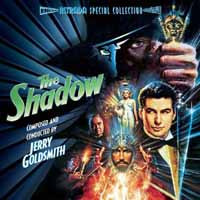- Composed by Jerry Goldsmith
- Intrada / 2012 / 135:05 (score 85:01)
While these days at least fifteen new comic book films are released every week, back in the 1990s they were still a somewhat rarer sight. The success of Tim Burton’s Batman did bring a few in its wake, and The Shadow is one of those. It’s a film with a host of excellent points, in particular its gorgeous look which beautifully captures aromantic vision of 1930s New York; and you can see in the script a lot of clear (but probably coincidental) precursors to Christopher Nolan’s enormously successful Batman reboot. But director Russell Mulcahy’s attempts to inject humour into the film often fall flat and Alec Baldwin – a wonderful actor – is hopeless in the lead role.
It’s a shame Jerry Goldsmith didn’t have chance to get involved in the flurry of comic book films that have come along in the last few years because his style would have lent itself perfectly to them – his ability to get a theme that captures the spirit of a character and film and moreso, his ability to inject an emotional connection between character and viewer was second to none. But The Shadow was the second of just two comic book films to benefit from his immeasurable talents; he attacked the film with the usual vigour and flair, writing one of the most distinctive and impressive scores of this era of films in the genre and – perhaps most impressively – doing so in a style which is far removed from that employed by Danny Elfman on Batman (and copied by virtually all composers on these films right up until Hans Zimmer’s retrograde step in Batman Begins became the rather less desirable template).
The score opens with “The Poppy Fields”, which introduces the main theme, which is total Goldsmith dynamite. It’s curiously similar to a secondary motif in Franz Waxman’s Prince Valiant – whether this was deliberate or came from the composer’s subconscious I’ve no idea, but in any case it’s one of the most memorable film themes of the 1990s, Vibrant and (ironically) colourful, it darts across wide intervals as the horns blast it out; it’s heroic when it needs to be, but also used as a binding motif through much of the action material. The cue also features another of the score’s key devices, a trombone glissando the composer uses to suggest the Shadow’s presence throughout the film. There are secondary themes for the villain (a more brooding piece often accompanied by particularly elaborate percussion) and, most notably, a wonderful love theme, heard for the first time in “Secrets” and developed over the course of several more cues as the score progresses.
There’s a lot of action here and it is handled – inevitably – with spectacular aplomb. Veering between bright and colourful for more heroic moments and dark and murky for more desperate encounters between good and bad, the composer delves through his bag of tricks to bring maximum excitement to the screen (and now album). “Chest Pains”, with the familiar low-end piano and percussion providing the backdrop to manic brass and string runs, is a treat – Jerry Goldsmith wrote action music like nobody else, somehow managing to produce breathless excitement without ever resorting to headache-inducing crash-bang-wallop. Perhaps best of all is the explosive finale music, “The Mirrors”, presented here in two very different versions (the sequence was heavily re-edited after the composer first recorded the piece).
The 1994 soundtrack album for The Shadow featured about half an hour of good material from Goldsmith’s score, but omitted a wealth of action music and missed the love theme out almost entirely. Regular readers may have noted that I am not always enamoured by expanded versions of scores, but in this case the 2012 release from Intrada is vastly superior, showcasing a score that is far more balanced and contains far more depth than the initial album release suggested. You can hear for the first time the themes being developed over the course of the score, hear how cleverly the composer weaves them together at key moments. Bruce Botnick’s recording is dynamic and brings out all of the score’s different colours very well. It probably doesn’t quite sustain 85 minutes, but even at that length it is consistently entertaining and impressive. ****
facebook.com/moviewave | amazon.com













So, owning the old release, this is one of those that deserves to be bought again? 🙂
I agree with you James. I’ve had the original CD for years and always enjoyed it, but this new version really brought some hidden highlights out. Both versions of “Mirrors” are excellent (but I like the film version a bit more). The villain’s theme also gets a bit more play in this version, and I love all that percussion.
However I do here quite a bit of Elfman influence on the score. Mostly in the darker feel and textures of the music. Yes, it’s still very much Goldsmith, but far removed from what he did on “Supergirl”. I think that the Elfman sound was asked for and Goldsmith adapted it wonderfully and made it his own. Really a great score and one of my favorite of his from the 90s.
the trombone glissando thing is from THE PRIZE in the 60s!
I dont hear Elfman but in the main theme, a little… Its mostly Goldsmith 100%, unmistakable. Of course it’s not SUPERGIRL, which was 10 years earlier.
He used that trombone glissando a lot! Quite prominent in The Edge, too.
I recently listened to this for the first time, and it put me in mind of Star Trek V at times. Not sure why. I’m looking forward to listening to it again.
Mastadge, I think you’re right, and that might be because of the “illusions and brainwashing” theme the two films share, handled with the same kind of mysterious textures and melodies by Goldsmith.